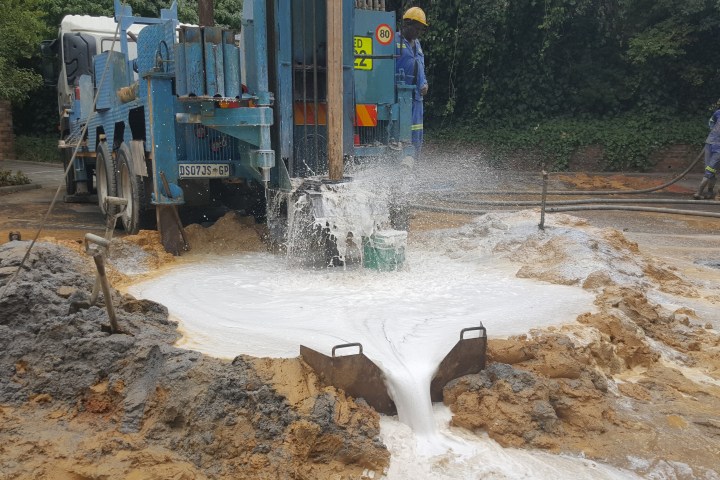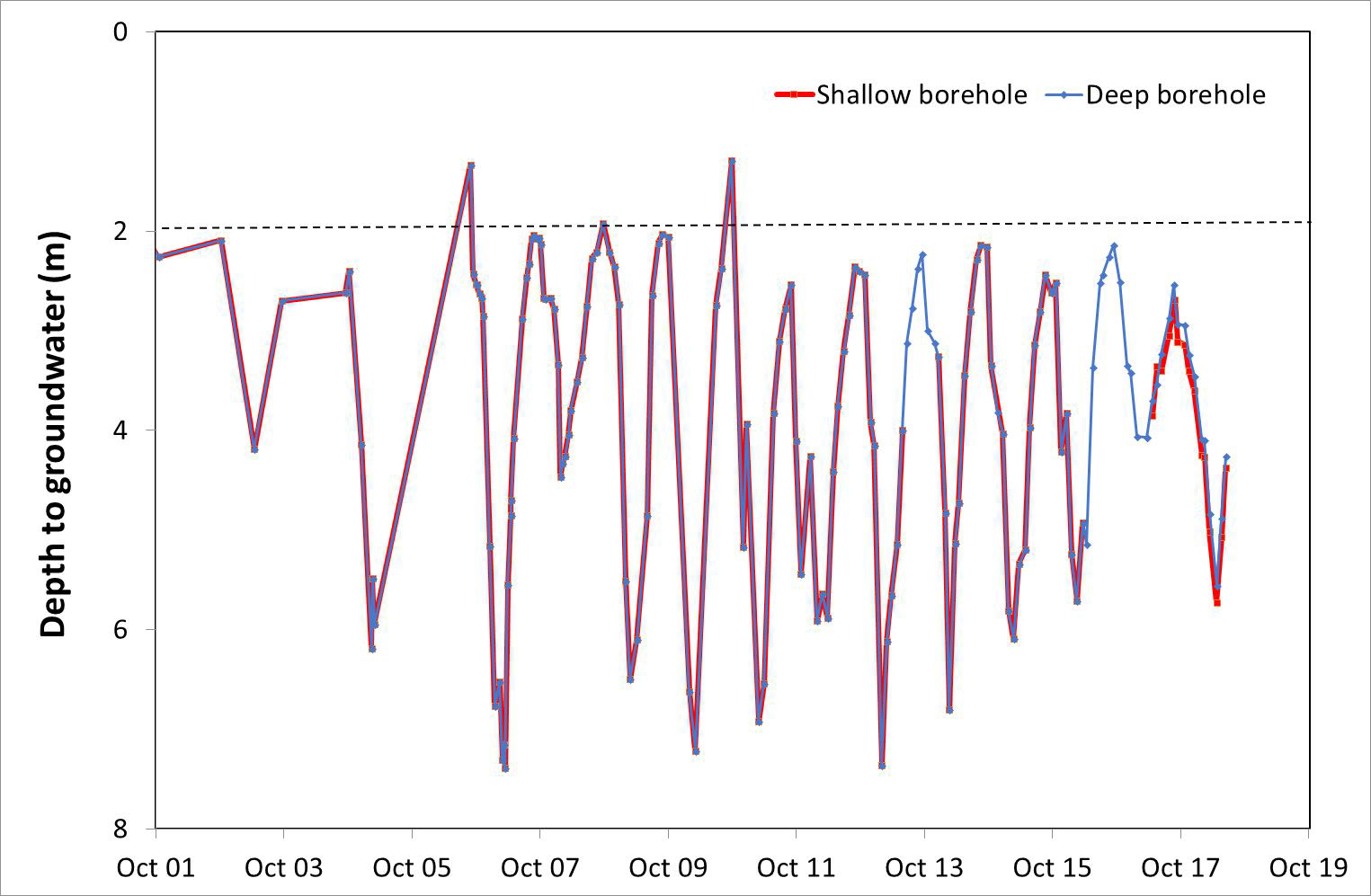OP-ED
Cape drought: What’s happening to our groundwater?

It would be a pity if all the energy and money spent on groundwater drought relief projects over the past couple of months does not realise some meaningful contribution to better understanding of groundwater in and around Cape Town.
I totally get it that Cape Town wants to – and needs to – send out the message that we are through the drought and it is back to business as usual. The City and the people that live in it desperately need a healthy and vibrant economy, as does the agricultural sector inside the City and in the surrounds. Water is a key part of the equation, and the recovery of dam levels – now at a out 56% – gives us hope. Given that predicting of the rise in dam levels is far more complicated and uncertain than predicting the draw down, my past predictions suggest I should not even try.
The drought brought groundwater into the spotlight, being one of the potential alternative sources of water as dams dried up. It is probable that it will now fade underground again as we rely on more tangible and easily reticulated and managed surface supplies. The ill-considered plan to source 100 ML/d for Cape Town from groundwater as an immediate emergency measure failed to materialise. But this is hardly surprising. The City’s groundwater exploration hardly got out of the starting blocks. It has always been my take that the absence of hydrogeological input, when coming up with these emergency plans, is to blame for this.
Recently I attended a presentation on a groundwater implementation plan for the City of Cape Town. The work was undertaken as part of international support to Cape Town. The relatively small gathering contained only three hydrogeologists. Both the presenter and questions from the floor claimed that we do not know enough about our groundwater resources and that we need more data and more research. This thinking is not unique to this particular gathering. As a scientist, it floors me that a better attempt is not made to engage with those that do – or might – know something about the subject. The scientific method demands this. In this instance, the international hydrogeologist who undertook the work had no clue about what information was and wasn’t available.
Good leaders surround themselves with people who can provide them with information they need, not information they want. Yet, who has been advising the City on groundwater matters? Who advises them as to what can be done or can’t be done? What groundwater credentials sit on these committees who make the decisions that impact us all. It really is disappointing to hear the City claiming victory for now pumping 5 ML/d or 10 ML/d from the Atlantis Aquifer – they had been pumping some 14 ML/d for years before allowing the Atlantis Water Resource Management Scheme to fall into disrepair from 1999 onwards.
Now is not the time to take cheap shots at those who were staring down the barrel of a gun and had to take hard decisions in the face of much uncertainty. But if we are going to learn anything from this drought, we need to review what was done and why. We were told that the plan was to provide up to 250 ML/d from desalination for the drought-stricken area from as early as 2018; yet we still only have two insignificantly small plants producing some 5 ML/d. Reflecting on this type of thing is critical if in the future we are to handle similar situations better.
As soon as emergency drought relief drilling started, the chorus went up about the impact this would have on the environment. This is as standard as claims that my brother’s sister’s uncle can find groundwater using a stick. Such claims usually include protestations that we don’t have enough data and we need to do more research – invariably supported by reference to an overseas calamitous situation. This choir – which includes a bunch of professors, water experts, environmentalists and others – seem to be unaware of the role groundwater has played – and is playing – in the development of this country.
The first abstraction of groundwater probably took place by buckets or similar receptacles being used to lift water from hand dug wells. The wind pump that was erected on Brinks Farm near the current-day Saldanha in 1848 was possibly the first mechanical method employed for this purpose. Groundwater now accounts for about 13% of all water used by municipalities in the province, while the quantum of its use by the agricultural sector is also significant.
In the Western Cape alone, more than 60 towns and villages rely on groundwater to some degree. And this has not happened overnight. This has been going on for decades. So where are the environmental impacts from this groundwater abstraction? What have we learnt from this abstraction in our own backyard? Why is it that Professor John Cherry – an eminent hydrogeologist from Canada who visited us in October 2017 – recognised us as leaders in the field of fractured rock hydrogeology? Is it because we paid his plane ticket to attend our groundwater conference – a conference held every two years since 1978 and usually attended by 300 delegates? Or is it because we do have a groundwater community that is knowledgeable and experienced in this field?
Like all professions, we have good hydrogeologists and not so good hydrogeologists. We seem to be particularly vulnerable to untrained individuals and scientists in related professions claiming expertise in this field. While we bumble along trying to get a professional hydrogeological registration in place, the only recourse available to those wanting hydrogeological support is through fact-checking and due diligence. But let us leave this particular discussion for now, as it is a story in itself.
The groundwater community has to take some responsibility for not having the ear of senior decision-makers. Dr Shafick Adams of the Water Research Commission made a good point recently when he asked us what keeps leaders in politics and business awake at night. It certainly isn’t things like the transmissivity of aquifers and its variability in space. Or borehole yields and borehole interference. Or even drilling methods and difficult drilling conditions. Most hydrogeologists are not that sexy and exciting – irrespective of what we may think. We like to get lost in detail and take ages to get to the point. Simply put – we can’t communicate information that decision-makers really need to know. We don’t have a topic as worldly as climate change or empty dams. The stories of a sinking Venice or collapsing sink-holes may be interesting, but hardly gripping. The detractors of the use of groundwater like to quote examples of large-scale subsidence, drying rivers and plunging groundwater levels – all overseas examples of course.
Righteous environmentalists make the inference that groundwater development and use is environmentally damaging – and that hydrogeologists neglect the risks posed by their efforts. Simply put – this is insulting. The hydrogeologists I know are all environmentalists at heart. There is no doubt that we can do things better to lessen our footprint. But a review of groundwater use in this country points to it having no more than very small and insignificant environmental impacts. We spend our lives determining the safe yield of aquifers – a term that ties in closely to the concept of sustainability. While we might grapple with defining this with any certainty, we are very good a defining when sustainable limits have been exceeded.
As a group, the groundwater community needs to learn to effectively and efficiently share pertinent information to those that need it. Using the recently attended groundwater presentation as an example, the speaker was describing the volume of groundwater that could be abstracted from aquifers in an around Cape Town. He expressed the abstractable volume in million cubic metres per year. Well – how much is that? Unless you are conversant with this unit of measure – and most in the audience probably weren’t – the figures presented were meaningless. I am certain that if he presented the volumes in megalitres per day everybody would have grasped what he was saying. As a result of the drought, we have all been sensitised to the water demand of Cape Town being set at 600 ML/d or 500 ML/d or 450 ML/d, so we have a feel for what this means. Pumping 50 ML/d from the Cape Flats Aquifer means a whole lot more to Capetonians than the scientific notation of 18.25 x 106 m3/a.
From the same presentation I learnt that there are about 3,000 well points and 5,000 boreholes in Cape Town – almost all of them clustered in the leafy suburbs were people can afford to drill and get off the grid. This contrasts to unqualified estimates of 30,000 boreholes being used in the City. We have little scientific data to show how much groundwater is being pumped – other than some back-of-the-cigarette-box guestimates. The volume of groundwater abstracted may be in the order of 10 – 15% of recharge, a relatively small amount. Domestic groundwater use may be in the order of 10 ML/d, but we know that a number of industries have turned to groundwater to keep their doors open. The absence of widespread monitoring precludes an assessment of negative impacts, an issue that neither the City of Cape Town nor the Department of Water and Sanitation seems particularly interested in taking responsibility for.
While we get weekly updates of dam levels across the country, the same is not true for groundwater. I regularly hear that the aquifers in and around Cape Town are getting hammered by the drought and the frenzy to abstract groundwater. I never see any measured data to support such claims. Below is a graph of groundwater levels regularly measured by the Department of Water and Sanitation in two boreholes in Bellville. While the groundwater levels display some minor intra-annual fluctuations in addition to obvious seasonal pattern, there is no evidence of any significant dewatering as a result of the drought.

Groundwater levels measured in two boreholes adjacent to each other in Bellville, showing no sign of the impact of drought or groundwater abstraction. The onset of the current winter recovery is apparent. Data source: Department of Water and Sanitation
While the future of my current drought-related work in the province is uncertain, we have installed or are busy installing over 100 data loggers across the province, many within Cape Town. These instruments measure groundwater levels at whatever frequency you like. We are taking measurements on an hourly basis. There is a good chance that money allocated to drought relief will soon be shifted elsewhere as we rightly or wrongly gain comfort and security with rising dam levels. It would really be a pity if all the energy and money spent on groundwater drought relief projects over the past couple of months does not realise some meaningful contribution to better understanding groundwater in and around Cape Town. It is my plea that we continue the widespread monitoring of groundwater for the next two years. This will allow us to get a real sense of how these levels respond to recharge and abstraction. This information can then be made accessible to managers, researchers and practitioners so our knowledge can grow.
Now all I need to do is find a leader in Cape Town who will appreciate and support the investment required to better manage the new normal. DM
Dr Roger Parsons is a hydrogeologist with more than 30 years experience. He is the Director of Parsons & Associates Specialist Groundwater Consultantscc and former provincial branch chair of the Ground Water Division. He writes this article in his private capacity.


















 Become an Insider
Become an Insider